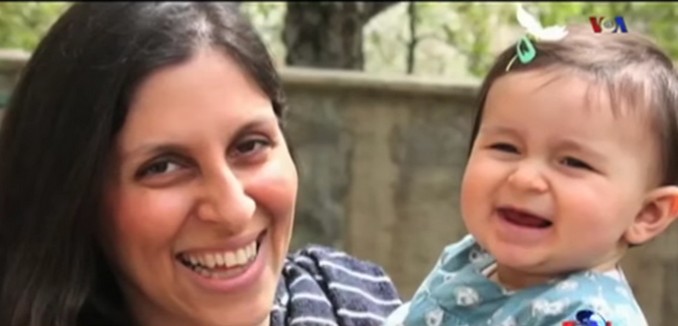An British-Iranian charity worker who was arrested last year by Iran on charges of attempting to overthrow the government has had her five-year sentence upheld by Iran’s judiciary, the Guardian reported Sunday.
Nazanin Zaghari-Ratcliffe, a project manager at the Thomson Reuters Foundation, was arrested in April while preparing to depart from Tehran’s international airport. She was separated from her toddler daughter Gabriella, who had her British passport confiscated and has since been living with her grandparents in Iran. Zaghari-Ratcliffe was sentenced to five years in prison on national security-related charges in October. At the time, Zaghari-Ratcliffe’s husband Richard, who denied the charges against his wife, said that she was being held as a “bargaining chip” to extract concessions from the United Kingdom.
The confirmation of Zaghari-Ratcliffe’s sentence took place earlier this month, but wasn’t made public until Sunday, according to her family.
Her imprisonment is “part of a string of cases involving dual nationals” that have “cast a shadow on the thawing in Tehran-London relations in the wake of the landmark nuclear deal,” the Guardian noted. “The Iranian judiciary has also arrested a number of other Iranians with dual citizenship from western countries in recent years.”
The growing threat to dual-nationals visiting Iran prompted the UK to warn its citizens in July that travelers to the Islamic Republic could be “arbitrarily detained.”
Last month, Iranian authorities warned Zaghari-Ratcliffe that if she didn’t keep her two-year-old daughter Gabriella with her in the notorious Evin prison, she could lose her parental rights.
Other dual nationals currently detained in Iran include U.S. resident Nizzar Zakka, an internet freedom activist who was was sentenced to 10 years in prison in September for spying despite having been invited to Iran by one of its vice-presidents; Siamak Namazi, a businessman who advocated for closer ties between the U.S. and Iran, who was sentenced alongside his 80-year-old father to ten years in prison in October; and Reza Shahini, a 46-year-old San Diego resident who was sentenced to 18 years in prison later that month for espionage-related charges and “collaborating with a hostile government.”
Canadian-Iranian scholar Homa Hoodfar, who was arrested last year when she returned to Iran to see her family, was released at the end of September—on the same day that Iran announced that it was holding talks with the Canadian government about reopening embassies in each other’s countries. Hoodfar told CBC News after returning to Canada that her interrogators “threatened to send my dead body back to Canada,” and that she was originally arrested for “dabbling in feminism” before having her charges arbitrarily changed to helping a hostile government subvert national security.
Hoodfar’s experience echoed that of Jason Rezaian, the Washington Post reporter who along with four other Americans was released by Iran in January 2016 on the same day that the Islamic Republic received a shipment of $400 million in cash. Rezaian and two family members have filed a federal lawsuit against Iran, claiming that Rezaian was taken hostage and tortured in order to “extort” concessions from the United States during nuclear negotiations. The suit also alleges that Rezaian “suffered such physical mistreatment and severe psychological abuse in Evin Prison that he…will require specialized medical and other treatment for the rest of his life.”
In Why Does Iran Keep Taking American Hostages?, published in the September 2015 issue of The Tower Magazine, Iran expert Ali Alfoneh described the regime’s detainment of foreign and dual-nationals as “a perfectly normal procedure and political practice in the Islamic Republic. That has been the case since the first day of the revolution and continues until today.”
[Photo: VOA Farsi / YouTube ]




